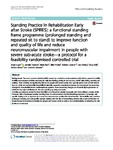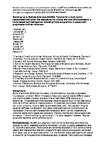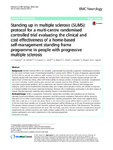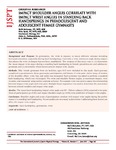Standing Practice In Rehabilitation Early after Stroke (SPIRES): a functional standing frame programme (prolonged standing and repeated sit to stand) to improve function and quality of life and reduce neuromuscular impairment in people with severe sub-acute stroke-a protocol for a feasibility randomised controlled trial.
| dc.contributor.author | Logan, A | |
| dc.contributor.author | Freeman, Jennifer | |
| dc.contributor.author | Kent, B | |
| dc.contributor.author | Pooler, Jillian | |
| dc.contributor.author | Creanor, Siobhan | |
| dc.contributor.author | Vickery, Jane | |
| dc.contributor.author | Enki, Doyo Gragn | |
| dc.contributor.author | barton, andy | |
| dc.contributor.author | Marsden, Jonathan | |
| dc.date.accessioned | 2018-04-27T09:56:02Z | |
| dc.date.issued | 2018-12 | |
| dc.identifier.issn | 2055-5784 | |
| dc.identifier.issn | 2055-5784 | |
| dc.identifier.other | 66 | |
| dc.identifier.uri | http://hdl.handle.net/10026.1/11365 | |
| dc.description.abstract |
Background: The most common physical deficit caused by a stroke is muscle weakness which limits a person's mobility. Mobility encompasses activities necessary for daily functioning: getting in and out bed, on/off toilet, sitting, standing and walking. These activities are significantly affected in people with severe stroke who typically spend most of their time in bed or a chair and are immobile. Immobility is primarily caused by neurological damage but exacerbated by secondary changes in musculoskeletal and cardiorespiratory systems. These secondary changes can theoretically be prevented or minimised by early mobilisation, in this case standing up early post-stroke.Standing up early post-stroke has been identified as an important priority for people who have suffered a severe stroke. However, trials of prolonged passive standing have not demonstrated any functional improvements. Conversely, task-specific training such as repeated sit-to-stand has demonstrated positive functional benefits. This feasibility trial combines prolonged standing and task-specific strength training with the aim of determining whether this novel combination of physiotherapy interventions is feasible for people with severe stroke as well as the overall feasibility of delivering the trial. Methods/design: This is a pragmatic multi-centre parallel single-blinded two-armed feasibility randomised controlled trial. Fifty people with a diagnosis of severe stroke will be randomly allocated to either the functional standing frame programme or usual physiotherapy. All patient participants will be assessed at baseline and followed up at 3 weeks, then 3, 6 and 12 months post-randomisation. Trial objectives are to determine the feasibility according to the following indicators:: (i) Process: recruitment and retention rate, ability to consent, eligibility criteria, willingness/ability of physiotherapists to recruit, willingness of patients to be randomised, and acceptability of the intervention; (ii) Resource: burden and potential costs; (iii) Management: treatment fidelity, participant adherence, acceptability and completeness of outcome measures, impact and management or orthostatic hypotension; and (iv) Safety: number and nature of adverse and serious adverse events. Discussion: The functional standing frame programme addresses a key concern for people who have suffered a severe stroke. However, several uncertainties exist which need to be understood prior to progressing to a full-scale trial, including acceptability and tolerance of the functional standing frame programme intervention and practicality of the trial procedures. This feasibility trial will provide important insights to resolve these uncertainties. Trial registration: International Standard Randomised Controlled Trial Number ISRCTN15412695. Registration on 19 December 2016. | |
| dc.format.extent | 66-66 | |
| dc.format.medium | Electronic-eCollection | |
| dc.language | en | |
| dc.language.iso | en | |
| dc.publisher | Springer Science and Business Media LLC | |
| dc.subject | Early mobilisation | |
| dc.subject | Feasibility randomised controlled trial | |
| dc.subject | Function | |
| dc.subject | Neuromuscular impairment | |
| dc.subject | Physiotherapy | |
| dc.subject | Stroke | |
| dc.subject | Supported standing | |
| dc.title | Standing Practice In Rehabilitation Early after Stroke (SPIRES): a functional standing frame programme (prolonged standing and repeated sit to stand) to improve function and quality of life and reduce neuromuscular impairment in people with severe sub-acute stroke-a protocol for a feasibility randomised controlled trial. | |
| dc.type | journal-article | |
| dc.type | Journal Article | |
| plymouth.author-url | https://www.ncbi.nlm.nih.gov/pubmed/29588861 | |
| plymouth.issue | 1 | |
| plymouth.volume | 4 | |
| plymouth.publication-status | Published | |
| plymouth.journal | Pilot Feasibility Stud | |
| dc.identifier.doi | 10.1186/s40814-018-0254-z | |
| plymouth.organisational-group | /Plymouth | |
| plymouth.organisational-group | /Plymouth/Faculty of Health | |
| plymouth.organisational-group | /Plymouth/Faculty of Health/Peninsula Medical School | |
| plymouth.organisational-group | /Plymouth/Faculty of Health/Peninsula Medical School/PMS - Manual | |
| plymouth.organisational-group | /Plymouth/Faculty of Health/School of Health Professions | |
| plymouth.organisational-group | /Plymouth/Faculty of Health/School of Nursing and Midwifery | |
| plymouth.organisational-group | /Plymouth/REF 2021 Researchers by UoA | |
| plymouth.organisational-group | /Plymouth/REF 2021 Researchers by UoA/UoA03 Allied Health Professions, Dentistry, Nursing and Pharmacy | |
| plymouth.organisational-group | /Plymouth/Research Groups | |
| plymouth.organisational-group | /Plymouth/Research Groups/FoH - Applied Parkinson's Research | |
| plymouth.organisational-group | /Plymouth/Research Groups/Institute of Health and Community | |
| plymouth.organisational-group | /Plymouth/Research Groups/Institute of Translational and Stratified Medicine (ITSMED) | |
| plymouth.organisational-group | /Plymouth/Research Groups/Institute of Translational and Stratified Medicine (ITSMED)/CBBB | |
| plymouth.organisational-group | /Plymouth/Research Groups/Institute of Translational and Stratified Medicine (ITSMED)/CCT&PS | |
| plymouth.organisational-group | /Plymouth/Research Groups/Plymouth Institute of Health and Care Research (PIHR) | |
| plymouth.organisational-group | /Plymouth/Users by role | |
| plymouth.organisational-group | /Plymouth/Users by role/Academics | |
| plymouth.organisational-group | /Plymouth/Users by role/Researchers in ResearchFish submission | |
| dc.publisher.place | England | |
| dcterms.dateAccepted | 2018-02-19 | |
| dc.rights.embargodate | 2018-6-15 | |
| dc.identifier.eissn | 2055-5784 | |
| dc.rights.embargoperiod | No embargo | |
| rioxxterms.funder | National Institute for Health Research | |
| rioxxterms.identifier.project | A feasibility study to investigate the effects of a functional standing frame programme in people with severe sub-acute stroke on function, quality of life and neuromuscular impairment; and a systematic review on non-pharmacological interventions for orthostatic hypotension | |
| rioxxterms.versionofrecord | 10.1186/s40814-018-0254-z | |
| rioxxterms.licenseref.uri | http://www.rioxx.net/licenses/all-rights-reserved | |
| rioxxterms.type | Journal Article/Review | |
| plymouth.funder | A feasibility study to investigate the effects of a functional standing frame programme in people with severe sub-acute stroke on function, quality of life and neuromuscular impairment; and a systematic review on non-pharmacological interventions for orthostatic hypotension::National Institute for Health Research |





